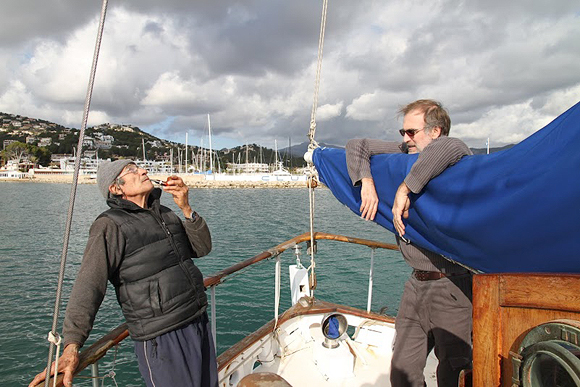
It’s been a long winter, but it passed quite fast to me. As always, still over the water, or close to it.
I’m currently writing from a train that’s running over the water too: It’s the bridge connecting Venice to Europe. Connecting Europe to Venice, more precisely.
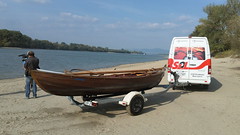 Last time I wrote, I was in Budapest. In the meantime, Clodia has taken a most deserved sleep under a blue sheet and a blanket of snow and ice, that has caused so many troubles around the Danube this year. I’ll soon get to see what’s left of this tough winter. After taking a few days of rest in Venice along with my parents, my best friends (Kaos & Nix) and a few other very close people, I reached my beloved boat (and house) Brancaleon.
Last time I wrote, I was in Budapest. In the meantime, Clodia has taken a most deserved sleep under a blue sheet and a blanket of snow and ice, that has caused so many troubles around the Danube this year. I’ll soon get to see what’s left of this tough winter. After taking a few days of rest in Venice along with my parents, my best friends (Kaos & Nix) and a few other very close people, I reached my beloved boat (and house) Brancaleon.
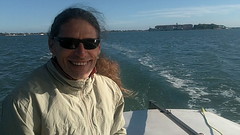 A dear friend of mine, skipper Stefano Leon Rodriguez, sailed it in just 12 days from Kos to Port de Pollença in Mallorca: 1.200 miles east to west.
A dear friend of mine, skipper Stefano Leon Rodriguez, sailed it in just 12 days from Kos to Port de Pollença in Mallorca: 1.200 miles east to west.
In my plans, a week should have been enough to check it and then move on to Wien, as I promised to Captain Franz aboard the Frederic Mistral.
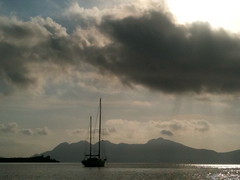 However I underestimated the task. My winter has been all about scratching, sawing, painting and cleaning.
However I underestimated the task. My winter has been all about scratching, sawing, painting and cleaning.
Brancaleon was left on its own for nearly two years: An old lady like her, alive as all wooden boats are, gave it up a bit.
A relationship requires closeness and participation, otherwise things may get harsh.
In the nice bay of Port de Pollença I found the beauty of a wonderful island and many new friends.

Roberto Beggio, skipper and seaman, has done a lot to keep Brancaleon up to its standards, helping me so much without asking anything in change. Our days went by dismantling, thinking, rubbing and so on. Every single boat piece needed some attention, small or large fixings. Thanks Roberto, from the deepest of my heart.
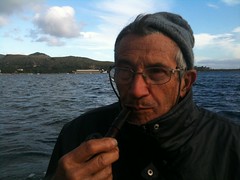 Fernando, a sea dog living aboard “Sua Illusion”, has been very helpful too, especially with the engine (beside mooring and other things) that I always watch with suspect and try to use as little as possible.
Fernando, a sea dog living aboard “Sua Illusion”, has been very helpful too, especially with the engine (beside mooring and other things) that I always watch with suspect and try to use as little as possible.
He’s a boat wizard and a philosopher: Our long talks, the wind whistling and his pipe will always stay on my memories.
How to forget Danielle from Belgium, who’s found a bay to rest and restart, Philip, who’s lent me some genial tools and above all his competence, Shaun, former Greenpeace, a life full of adventures and a big hart. And so many others. To all of them goes my gratitude.
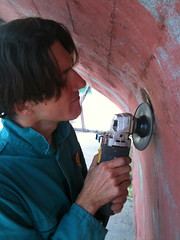 Francesco, our first guest sailor on Clodia, came to pay a visit too, giving me a great help on Branca. Also I like to mention four Frenchmen “très-sympa” on a beautiful trimaran, having their troubles on the way to the Pacific Ocean.
Francesco, our first guest sailor on Clodia, came to pay a visit too, giving me a great help on Branca. Also I like to mention four Frenchmen “très-sympa” on a beautiful trimaran, having their troubles on the way to the Pacific Ocean.
Antoni was a real discover. He’s a biologist who knows so much about his island, the natural reserve of Cabrera and the “marges”, dry-stone walls that mark the borders on the Mallorca’s mountains’ precious lands.
 With him and Martha, brilliant filmmaker and tireless walker, I shared one of the best experiences of my life: A night in the “barranc”.
With him and Martha, brilliant filmmaker and tireless walker, I shared one of the best experiences of my life: A night in the “barranc”.
The barranc is a little countryhouse surrounded by olive and orange trees: local farmers used to rest here in summer (or in winter while working on the marges). To reach the barranc in Mallorca, we took a fantastic one-hour walk in the snow, barefoot, with a freezing temperature .

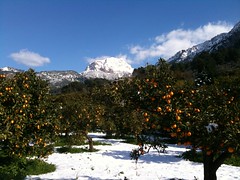 The snow was so high: Even on the beach you could admire an Alpine scenery. It doesn’t happen very often indeed.
The snow was so high: Even on the beach you could admire an Alpine scenery. It doesn’t happen very often indeed.
On the top of the Puig Maior, the highest peak in Mallorca from its 1.400 mt, there was over one metre of snow. We felt asleep in the barranc, in front of the cuddling flames coming from the fireplace. It seemed like being where I come from.
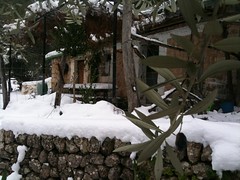 Antoni loves stones and boats, he’s worked for Greenpeace and the WWF. We’ll try to do something for this island that cares too little about water, consuming too much for a low level tourism.
Antoni loves stones and boats, he’s worked for Greenpeace and the WWF. We’ll try to do something for this island that cares too little about water, consuming too much for a low level tourism.
The very same island gets worn out from it: Port Andratx, a wonderful bay, nowadays looks like a real shitter, a place that just the jumped-up and poor in spirit can still love.
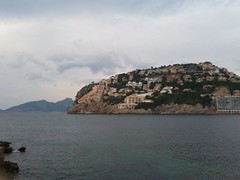 Not any longer that 40 years ago it was a gem, then it was bought by English, Italian, German and Spanish parvenues: Wild building and foolness, corruption and ignorance.
Not any longer that 40 years ago it was a gem, then it was bought by English, Italian, German and Spanish parvenues: Wild building and foolness, corruption and ignorance.
Somebody even thought to set up a corruption-tour, whose itinerary could be dedicated to unauthorized building. A good idea in Italy too.
Mallorca is very rich in water, but the uncontrolled use of pesticides and fertilizers has polluted the ground water. I alwas try to drink tap water, but it looks like I’m the only fool: Everyone says it’s polluted. Think about 50 million tourists using water careless, boaters cleaning their boats with freshwater, beside all farming usage. This island is at risk: The bottled water consumption is impressive. And plastic often gets burnt in the incinerators, we’ll work about that in our next project.
 Beate Werner, from the European Agency for the Environment, came to Palma to discuss about the future and invited me in Copenhagen. Other snow and other ice, often in the canals: I went there along with Nicola Zago (who’s helping me with new ideas) and I had a speech about our journey in the nice EEA headquarter.
Beate Werner, from the European Agency for the Environment, came to Palma to discuss about the future and invited me in Copenhagen. Other snow and other ice, often in the canals: I went there along with Nicola Zago (who’s helping me with new ideas) and I had a speech about our journey in the nice EEA headquarter.
I felt in love with Copenhagen: Ice, civility, wonderful and loved (wooden) boats. Little cars, so many bikes: So different from Mallorca (I wonder why we Mediterraneans ruin all the wonders we have been left).
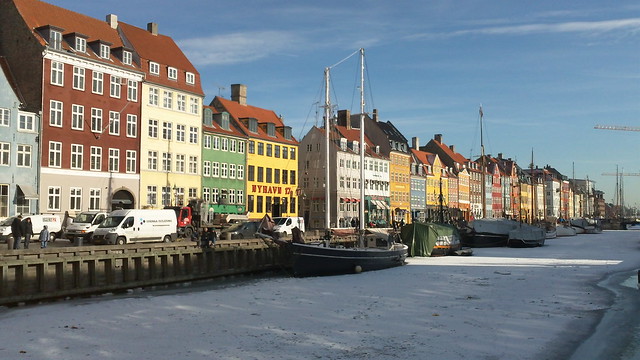
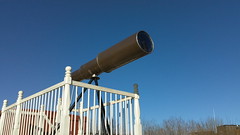 In Copenhagen I met Hartmut Stockter, a German artist creating beautiful things such as a telescope with a touching video, and had the chance to listen to a Joshua Redman concert.
In Copenhagen I met Hartmut Stockter, a German artist creating beautiful things such as a telescope with a touching video, and had the chance to listen to a Joshua Redman concert.
I’d love to have them both aboard Clodia in the future, to perform their art.
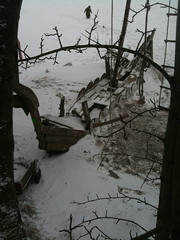 In the Viking Museum in Roskilde, I’ve burst into tears: For the first time in my life I found my roots, the call of the wild, of the timbers used to build boats. I come from there, from something that moves and from the cold.
In the Viking Museum in Roskilde, I’ve burst into tears: For the first time in my life I found my roots, the call of the wild, of the timbers used to build boats. I come from there, from something that moves and from the cold.
The Roskilde museum was built beside the place where six boats from the X and XI centuries were found. It’s managed in flawlessly: Boats are still built here by using simple techniques, following the tradition that successfully got through the trial of time. Magnificent boats, brilliantly taking the sea. In Roskilde there’s also a very comfortable hostel, with fair prices.
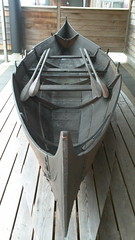 In the picture you can see the archetypal of Clodia.
In the picture you can see the archetypal of Clodia.
I went to pay my compliments to the direction for this pearl of museography: Mr Anton Engert welcomed me warmly, I really hope to work with them in the future.
I’d be over the moon if anything similar could be done in Venice!
It could promote a more sensible and caring tourism, tied to Europe’s maritime’s museums. Boats have built Europe, we often forget that: My dear friend Nicolò Zen, who’s built Clodia’s masts, is trying to set up a similar museum, only relying on his own resources.
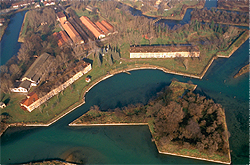 In the old Marghera fort, a structure designed in the 15th century by Michele Sanmicheli (military architect of the “Serenissima”), Nicolò already has created something that’s worth visiting, collecting many boats that have disappeared or are disappearing.
In the old Marghera fort, a structure designed in the 15th century by Michele Sanmicheli (military architect of the “Serenissima”), Nicolò already has created something that’s worth visiting, collecting many boats that have disappeared or are disappearing.
Just a few decades ago, all Northern Italy was navigable, across canals, rivers and swamps. The madness of cars and low bridges have denied us the chance to sail and to develop an economy that in France, UK, Germany and Flanders gives work to many people.
 This winter I had many other meetings: That organized by Stefano Venturini in Verona, a Pecha Kucha in Palma (20 slides, 20 seconds each and 6’40” in total to tell an idea: Genial).
This winter I had many other meetings: That organized by Stefano Venturini in Verona, a Pecha Kucha in Palma (20 slides, 20 seconds each and 6’40” in total to tell an idea: Genial).
I learnt a lot from a group of creative cooks, architect and filmmakers, in the charming frame of Palma’s old town. I’m now heading to Marseille, to participate to the VI Water International Forum and especially to the FAME, a side event about who want to use water to gain a profit and who think water is a human right available to everyone, such as the city of Paris that’s selling water at social fares.
Bottled waters, dams, canals, irrigation, oversize navigation: What will I see? But also small projects to restore old mills, renewable energies without abruptly changing the river bed, water culture. Abuse opposed to respect: It’s easy to tell which side we should choose, but King Money makes blind his subjects.
“Tap water is polluted by the toxic waste that you have dumped in the ground. Can you imagine what you’ve done?”
“Who cares, I drink bottled water!” was the sincere answer of a “camorrista” on his trial.
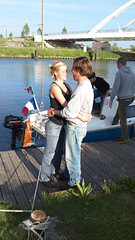 Man on the River restart is near, Bruno and Fine are far.
Man on the River restart is near, Bruno and Fine are far.
They’re crossing the Atlantic aboard the beautiful Miss Carol. You may follow their blog on http://www.carol-carol.net. Maybe Fine will reach us on the Black Sea, she’s been picked by Deutsche Welle for a Berlin stage: Hopefully the nice photos and the talent of Josephine will open her the door for a brilliant reporter career.
I miss Bruno and I wish him to come back soon, even if we haven’t still fixed our issues. That’s my only regret, and I know my faults: I’ve been neglectful to a friend. He’s always given me so much, he’s a great person. Forgive me Bruno, if I let you down.
Possibly, this year we’ll see two new entries as filmmakers. We’re trying to raise some funds for their participation on Indegogo, a nice website for crowd funding, since the documentary producers aren’t willing to anticipate any money and Paolo Muran and Nicola Pittarello nearly went broke to follow my crazy journey.
Anna Sandrini is Italian and Leon Greco is Argentinian: They’ll take over the hard and wonderful work done by Paolo, Nicola, Fine and Bruno. Without images we cannot make the documentary and it’ll be a very hard task on my own. Please help us if you can, by clicking here: Even a small donation can be important, thanks.
 I’m now planning the new start from Budapest, presumably mid-April. We also have a really interesting option: Having aboard another madman (“se no i xe mati no li volemo”): James Thomas is taking a 12.000 km walk from Scotland to New Zealand, equipped with a buggy to carry his luggage.
I’m now planning the new start from Budapest, presumably mid-April. We also have a really interesting option: Having aboard another madman (“se no i xe mati no li volemo”): James Thomas is taking a 12.000 km walk from Scotland to New Zealand, equipped with a buggy to carry his luggage.
I’ve got in contact with him through Holger, who came aboard Clodia on the Main and apparently is collecting all the craziest people coming to Hanau.
James will follow my same itinerary along the Danube, so I offered him a lift: We’ll see.
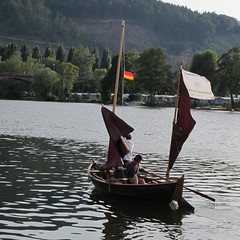 Clodia is in Dunakeszi, at Laszlo’s place. It’s there alone and I think about it every day: I wonder about its conditions. Water inside, damages from the ice, mould, mices looking for a roof? I’ll fix everything in a few days with a bit of linen oil and hard work, then I’ll set sails once again.
Clodia is in Dunakeszi, at Laszlo’s place. It’s there alone and I think about it every day: I wonder about its conditions. Water inside, damages from the ice, mould, mices looking for a roof? I’ll fix everything in a few days with a bit of linen oil and hard work, then I’ll set sails once again.
Sooner or later I have to get back to Wien, where an unkept promise to Captain Franz is still waiting to be fulfilled. But I’m a wanderer and he’ll understand: I never know what’s waiting for me behind the next river bend.
Be water
Giacomo
























Ciao Giac, bello che sia ritornato qua! Speriamo che tutto vada bene e come tu lo sogna…. Ti scrivo una piccola poesia di Mara Boifava:
Danubio
Musa di poeti
ispiratore di sogni
chi disse che tu,
denso liquido lento e malato,
le tue rive
amanti voluttuose
di città sognanti e danzanti,
in te non scorre vita,
tu,
alomo disperso
di una passione violenta
rechi distruzione e rovina.
Poesia dura che fa riflettere molto sul rapporto tra l’uomo e la natura.
Che cominci benissimo la seconda parte del tuo viaggio con una nouva compagnia sul blu Danubio! Saremo sempre con te!
Abbraccio
Grazie Bea, speriamo che la natura mi lasci passare.
Come sempre quando la nostra piccola vita si mette nel grande mondo
Un abbraccio come sempre
con affetto
g